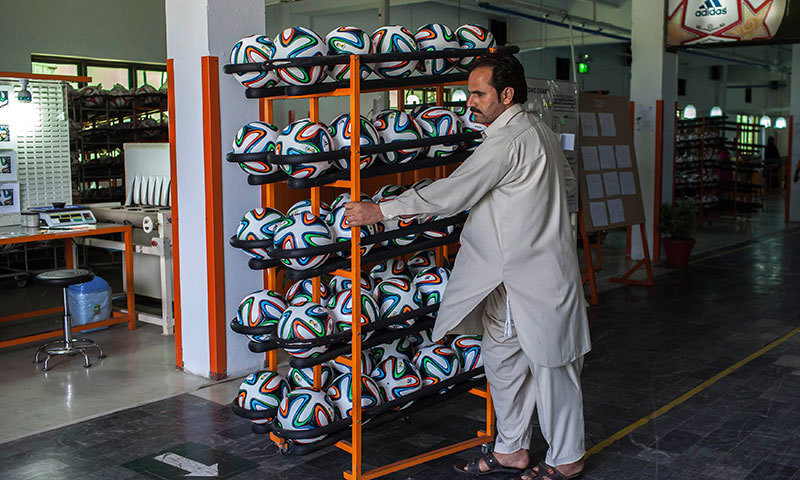What do swords and the football-loving British have in common? Not much except the start of a heritage that enabled Sialkot to become the richest city in Pakistan.
The blacksmiths of the region had been known to produce swords and daggers for the Mughal emperors. At the end of the 19th century, the manufacturing of surgical instruments began when the American Mission Hospital in Sialkot got its instruments repaired from the local blacksmiths.
In 1918, a British army officer brought his frayed football to be mended. A local craftsman stitched it up as well as replicated it, or so the story goes. A practice was started, which a century later made the region famous for its prestigious FIFA footballs.
Today, the city has the highest income per capita in the country. “At our peak, the per-capita income was $2,800. Adjusting for rupee depreciation, it is about $2,200-2,400,” says the former senior vice president of the Sialkot Chamber of Commerce and Industry (SCCI), Waqar Akram Awan.
Resistant to the economic fallout of Covid-19, Sialkot retained its workforce during the pandemic with no mass layoffs. Using regression techniques, an analyst argued that Sialkot’s surgical goods’ exports increase after economic shocks compared with Pakistan’s more traditional exports. One theory she postulated was that in years of diminished GDP growth, governments tend to increase public spending, including in the health sector. This results in an increase in the purchase of surgical goods, which helps insulate the city against adverse economic events.
Resistant to the economic fallout of Covid-19, Sialkot retained its workforce during the pandemic with no mass layoffs
The multi-commodity market of Sialkot works with over a hundred international brands and is dominated by small and medium enterprises (SMEs) that include various sectors, such as leather and textiles along with surgical and sports goods. Entrepreneurship and artisanal skill sets are handed down from generation to generation since before the partition, making export-oriented ventures part of the city’s culture.
Funds are raised for welfare projects and infrastructure projects such as roads through a self-imposed tax. A small percentage of each shipment is charged that contributes towards the Sialkot city package, which is managed by the SCCI.
“About 8,000 different products are manufactured, which is more than any other city in the world,” boasts Sialkot International Airport Ltd Chairman Mian Naeem Javed. The former SCCI president asserts that 97 per cent of Sialkot’s production is export-oriented; even goods that can be consumed domestically are intended for international markets.
Businessmen travel five to seven times a year with staff to promote their products making a domestic airport essential. “No airport except ours is privately owned; government priorities are political and ours is incompetent,” says Mr Javed. Taking matters into their own hands, business leaders built their airport. Where the government had estimated a cost of Rs18 billion, the private investors had it up and running in Rs3bn.
With the airport, the city’s exports increased from $700 million to roughly $2.5bn. Annually, the airport is used by about 1.2m travellers. “Post–Covid-19, the number will increase to 1.5m,” says Mr Javed.
While Sialkot’s exports are roughly 10-12pc of Pakistan’s exports, Mr Awan believes that it has the potential to earn about $10bn in five years if obstacles are removed and new products and innovations are launched. Sialkot is part of an export triangle with Gujrat and Gujranwala that specialise in furniture and light-engineering goods such as fans. He attributes lofty dreams of $5bn in half a decade to Gujrat and Gujranwala.
While joint ventures and introduction of new product lines by international companies are welcome, Mr Awan narrates the cautionary tale of blankets in Gujranwala where Chinese producers set up competing products to the detriment of local producers.
Though Sialkot’s jewel-in-the-crown surgical goods sector caters to quality-conscious countries such as Germany and Japan, it is not even among the top 30 exporters of instruments and appliances used in medical, surgical or dental sciences — a sector that had global exports of $134bn in 2019, according to International Trade Centre data. Pakistan’s name may be reputable, but at $409m exports last year, its slice of the international market is small.
The involvement of the business community has enabled Sialkot to prosper without being dependent on the government’s aid. A dry port, an airport, a self-imposed tax to maintain infrastructure and welfare projects such as Khud Kafalat Rozgar Trust are initiatives of the private sector that have allowed the city to flourish while the state’s draconian laws have left the government’s export-processing zone barren in an export-oriented region.
However, there is a long way to go from being a successful cottage industry of Pakistan to a global leader — a journey that the sector may not be able to undertake without active government support.
Published in Dawn, The Business and Finance Weekly, October 12th, 2020














































